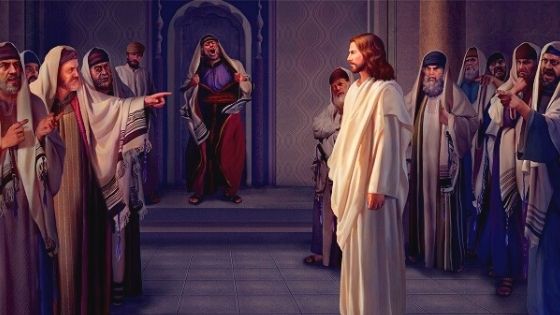Jesus is said to be the most loving and most compassionate person to ever walk the earth. Yet, He was also the most hated person to ever walk the earth. Even the religious leaders of His day hated him more than they hated the actual criminals. Now, why is that?
No one sits and wonders why society despises the wicked, the robber, the rapist, the murderer, etc. That’s completely understandable and justifiable. But I find it troubling when a morally upright person is deemed to be the worst criminal by those who claim to believe in God. What was it about Jesus that earned Him the punishment of crucifixion?

The Religious Leaders of Jesus’ Time
The indignation of the religious leaders towards Jesus during His time is undeniable. They hated Him so much to the point that they arrested Him, tried Him, and brought Him to Pilate for a death sentence. But what made them so angry at Jesus that they wanted Him dead?
Below are several things about Jesus that outraged them. We will look at each one of them and evaluate if their anger was justified.
The Claims Jesus Made
Jesus made several outrageous claims about Himself. One of which was His claim that He was the Messiah. By claiming to be the long-awaited Messiah, He was saying that His authority outweighed their authority. The religious leaders did not believe any of Jesus’ claims and were angry at the people who believed.
The leaders accused the people of believing Jesus out of ignorance. They were also jealous of the attention that Jesus was getting from the people. The claims Jesus made caused the religious leaders of His day to be indignant towards Him.
John 8:58-59
Jesus said to them, “Most assuredly, I say to you, before Abraham was, I AM.” Then they took up stones to throw at Him; but Jesus hid Himself and went out of the temple, going through the midst of them, and so passed by.

Jesus Threatened Their Religious System
When Jesus pointed out their hypocrisy in connection to their practices, the religious leaders saw Him as a threat. On two different occasions, Jesus entered the temple precincts and drove out those who were buying and selling (John 2:13-17).
Jesus angered the religious leaders with His claim of authority over the temple. Before Jesus came into the picture, the religious leaders were the respected authority in overall activities in the Temple. They could do all they wanted without anyone questioning their actions. Jesus’ arrival threatened their religious system and angered them to the point that they wanted Him dead.
Jesus Disrespected Their Traditions
One of the things that triggered the religious leaders’ hatred towards Jesus was His lack of respect for their religious traditions. Either Jesus ignored these traditions or He deliberately broke them. This is because He knew that these were man-made and not from God.
One common practice that Jesus violated which caused the most outrage was regarding the Sabbath. God had commanded the Sabbath to be a day of rest from labor. Yet the religious leaders added all kinds of restrictions which made it difficult and impossible to observe.
Jesus was grieved and angry at the way they had perverted the Sabbath observance. He asked the religious leaders several specific questions.
Mark 3:4-5
Then He said to them, “Is it lawful on the Sabbath to do good or to do evil, to save life or to kill?” But they kept silent. And when He had looked around at them with anger, being grieved by the hardness of their hearts, He said to the man, “Stretch out your hand.”
In the presence of the religious leaders, Jesus healed a man on the Sabbath. This healing that Jesus performed on the Sabbath was more than the leaders could endure. Thus, they were convinced that Jesus had to die.

Jesus Socialized With “Sinners”
The religious leaders of Jesus’ day were filled with pride and arrogance. They were particularly proud of not mingling with the outcasts of society. It’s because they did not believe that the Messiah would be with such a crowd. A Pharisee went nuts at the sight of Jesus allowing a woman to wash His feet.
Luke 7:39
Now when the Pharisee who had invited Him saw this, he spoke to himself, saying, “This man, if He were a prophet, would know who and what manner of woman this is who is touching Him, for she is a sinner.”
The religious leaders thought of themselves as righteous men who must never associate with sinners. Seeing Jesus socializing with these kinds of people infuriated the proud Pharisees and other religious leaders.
Jesus Performed Miracles
The miracles Jesus performed before them and many on-lookers also angered the religious Jews. After witnessing the healing of a demon-possessed man, some of the multitudes questioned if Jesus could be the Messiah. But the leaders accused Jesus of casting out demons by the power of a demon.
Matthew 12:22-24
Then one was brought to Him who was demon-possessed, blind, and mute; and He healed him so that the blind and mute man both spoke and saw. And all the multitudes were amazed and said, “Could this be the Son of David?” 24 Now when the Pharisees heard it they said, “This fellow does not cast out demons except by Beelzebub, the ruler of the demons.”
The miracle was undeniable! The man who was not only deaf and mute but also demon-possessed was healed. But rather than believing Jesus to be the Messiah, these religious leaders attributed His power to the devil.
Since their official explanation for what Jesus did was that His power came from the devil, then He must die.
Jesus Threatened Their Lifestyle
For political reasons, the religious leaders wanted to kill Jesus. There were some ongoing tensions between the ruling Romans and the Jews. Thus, the thought of a Messiah who might lead an uprising against Rome was the last thing the people wanted.
John 11:49-51
And one of them, Caiaphas, being high priest that year, said to them, “You know nothing at all, nor do you consider that it is expedient for us that one man should die for the people, and not that the whole nation should perish.” Now, this he did not say on his own authority, but being high priest that year he prophesied that Jesus would die for the nation.
Caiaphas was afraid the Romans would intervene if Jesus gained the support of the people. This, among other reasons, is why he insisted that Jesus must die.
Conclusion
The religious leaders’ motive for wanting Jesus dead was not anything godly or righteous. They hated Jesus and wanted to put Him to death because of the above-mentioned reasons.
In the end, it was their pride, arrogance, and hypocrisy that caused them to bring Jesus before Pilate to be crucified. They did not want to hear the truth from God.
Jesus was hated by the world and did not receive Him (John 1:11). And He warned us that because they hated Him first, they would also hate us.
John 15:18-19
“If the world hates you, you know that it hated Me before it hated you. If you were of the world, the world would love its own. Yet because you are not of the world, but I chose you out of the world, therefore the world hates you.”
Many religious people today are easily triggered when a “redeemed” believer dares to point out their wrong beliefs and practices. They tend to become defensive and hostile when told the truth about salvation by grace and not by works.
But no matter how people with a different worldview despises your faith in Christ as your Savior, be patient with them. Keep trying to reach out to them and share God’s gift of salvation. Most of all, keep loving them and praying that they too would come to faith in our Lord Jesus.
Reference:
The Life and Ministry of Jesus Christ by Don Stewart
What was the world like into which Jesus came? What were the different political and religious divisions of the Holy Land?
This first section will examine the historical background of the world that saw the coming of Christ as well as some of the important characters that were prominent in the four gospels.
Part 2 The Life And Ministry Of Jesus This section examines some of the key elements of the public ministry of Jesus. Although His public life was for a period of a few short years, He has influenced the course of this world like none other.
In this first section, we will find out why He came to this world, His relationship to the Law of Moses, His miraculous deeds, and His relationship to Bible prophecy.
Part 3 The Betrayal, Trial, And Death Of Jesus The Last Days Of Christ This final section will look at some of the events of the end of the life of Jesus. We consider His betrayal and death. When Jesus was a child the first recorded thing that He uttered was that He must be about His Father’s business (Luke 2:49).
On the cross, Jesus’ final words were, “It is finished.” Jesus announced to the world that He had completed His Father’s business.


Thank you for this helpful lesson.
Really, Jesus came for the sinners who were viewed as filthy in the eyes of the religious leaders. I have learned to value even those who are seen as unworthy by society as well as be aware of the hypocrisy of religious leaders.
You are very welcome, Rudolf.
Our Lord modeled true compassion and if we claim to be His followers, we are to emulate Him.
We can start by loving those who are considered to be the “outcasts” of society and sharing the gospel with them.
We may get ridiculed by those who belong to the “upper class” but let us not be discouraged. Rather, let us continue to do the Father’s business while waiting for the Lord to come back.
Shalom!
Hey there!
I just finished my homework, so I decided to peruse through one of your presentations
The Pharisees did not just hate Jesus Christ for who He is, but what He represents! He is of the truth, and the world despises truth. Now you know what Christ meant when he said that Satan is the god of this world. If you love the truth, you will love the God of truth, which is Jesus Christ. If you hate the truth, and love lies, you love Satan, the god of falsehood. No in-between!
You hate one another and adore another thing. You can’t serve two masters. Many will become defensive in order to stay in their fleshly positions, but the truth will come out, and will set the captive free!
Here’s a riddle I want to pose to you today. How can a liar hate lies, and a truth-teller hate truth? How can sheep hate sheep, and a wolf hate the wolf? How can Jesus despise His own, and Satan betray the world he befriends?
Surely, man will despite what is delightful, and admire the detestable.
🙂
Hi Maia,
That is so true; the Pharisees being the biggest hypocrites during their time hated the truth. Why? It’s because they couldn’t handle the truth. Oh yeah, that’s Jack Nicholson’s famous line in the movie “A Few Good Men” ☺
Thanks again, Maia.
God bless you more!